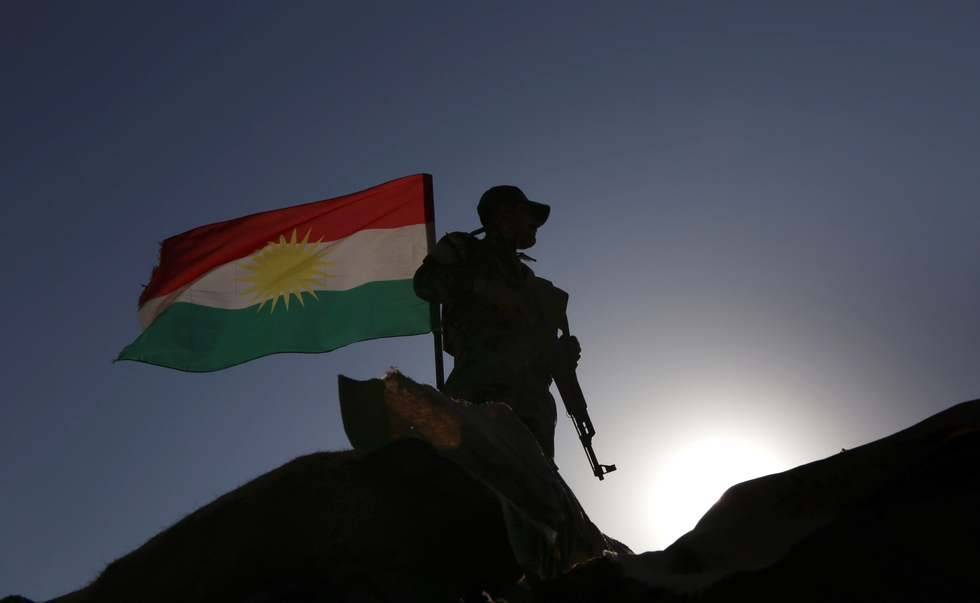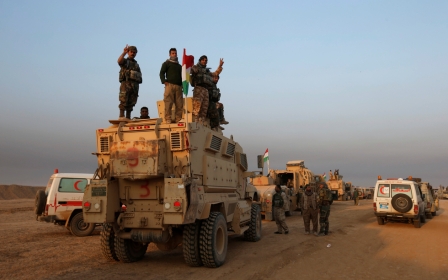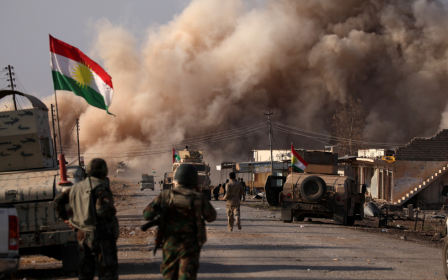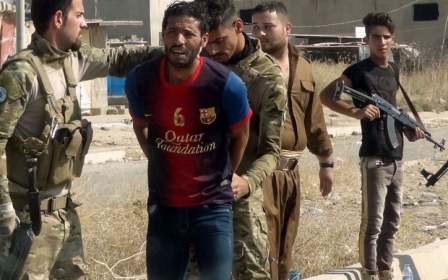On the road to Mosul: Iraqi Kurds seize IS-held town of Bashiqa

Iraqi Kurdish forces have seized the town of Bashiqa near Mosul from Islamic State (IS), an official said Tuesday, as US-backed militia forces advanced on the militants’ Syrian stronghold Raqa.
Capturing Bashiqa would be a final step in securing the eastern approaches to Mosul, three weeks into an offensive by Iraqi forces to retake the country's second city.
Iraqi troops have also seized the town of Hamam al-Alil south of Mosul. On Tuesday investigators carried out an initial examination of a mass grave site discovered in the area.
Up to 100 bodies, many of which were beheaded, were found at the site, believed to have been victims of IS executions.
Bashiqa was under the "complete control" of Kurdish peshmerga forces, Jabbar Yawar, secretary general of the Kurdish regional ministry responsible for the fighters, told AFP.
"Our forces are clearing mines and sweeping the city," Yawar said.
READ: Mosul has always been central to conflicts in the region
An AFP correspondent on the outskirts of Bashiqa said clashes were continuing, with three air strikes hitting the town and gunfire and an explosion heard.
The peshmerga said there were still some suicide bombers and snipers there, and that about five percent of Bashiqa remained under militant control.
Iraqi forces have been tightening the noose around Mosul since launching the offensive on 17 October, with elite troops last week breaching city limits.
Upping pressure on militants, the Kurdish-Arab Syrian Democratic Forces (SDF) militia alliance on Saturday began its own offensive against IS's other main bastion, Raqa in Syria.
Raqa and Mosul are the last major cities in Syria and Iraq under IS control. Their capture would deal a knockout blow to the self-styled "caliphate" it declared in mid-2014.
'Determined to succeed'
The US-led coalition that launched operations against IS two years ago is providing crucial backing to both offensives, with air strikes and special forces advisers on the ground.
SDF forces have been pushing south from areas near the Turkish border towards Raqa. Alliance spokeswoman Jihan Sheikh Ahmed said Tuesday they had moved to within 36km (22 miles) of the city.
"Two more villages have been taken since yesterday," she told AFP, adding that SDF forces had so far advanced 14km (nine miles) closer to Raqa from Ain Issa, the operation's main staging point.
'The fighting continues; morale is good and our fighters are determined that this offensive will succeed'
- Jihan Sheikh Ahmed, alliance spokeswoman
"The fighting continues; morale is good and our fighters are determined that this offensive will succeed," she said.
The conflict has prompted a steady trickle of civilians to flee IS territory, most heading towards Ain Issa. "We were afraid of the planes, and we were afraid of the IS fighters," said 34-year-old Wazira Al-Jeely from Al-Tuwaila village. "When the strikes started, we took off our burqas and said 'we're done with you' and we ran away."
Dozens fled the area aboard pick-up trucks and vans. Some left on mopeds, while others escaped on foot with their sheep and goats.
SDF fighters stopped them a few kilometers from Ain Issa, checking their identities and searching belongings to avoid infiltration by militants.
As in the battle for Mosul, the goal of the Raqa offensive is to surround and isolate IS inside the city before mounting a street-to-street assault.
In both cases officials are warning of long and bloody battles ahead, with IS expected to put up fierce resistance and use trapped civilians as human shields.
More than a million people are believed to be in Mosul. Raqa in 2011 had a pre-war population of some 240,000, and more than 80,000 people have since fled there from elsewhere in Syria.
Iraqi forces scored another victory against IS on Monday by establishing full control over Hamam al-Alil, about 15km from the edge of Mosul and the last town of note on the way to the city from the south.
Mass grave site
They said a mass grave was found at an agricultural college in the area, with the offensive's Joint Operations Command adding that "100 bodies of citizens with their heads cut off" had been uncovered.
An AFP journalist Tuesday said body parts and bones were visible among rubbish dumped there. Men in Iraqi security forces uniforms used ropes to pull two bodies, one headless, from the grave, and also removed a decapitated head.
"Today, the team conducted an initial examination," said Mohammed Taher al-Tamimi, an Iraqi cabinet official.
Tamimi said the victims had been blindfolded with their hands and feet bound. He said around 25 bodies were initially visible, but investigators believed "very large numbers" of corpses were there.
Dhiyab Tareq, a 32-year-old from the area, said he had heard shots when IS carried out executions at the site.
"I was sitting close to the door and heard the gunshots," Tareq said, adding that the next day IS members boasted about killing security forces members.
IS's rule has been marked by atrocities including mass beheadings and other executions.
Thousands displaced
Nearly 42,000 people have fled their homes since last month's start of the operation to recapture Mosul from the Islamic State group, the International Organization for Migration said Wednesday.
Aid organisations have warned that more than a million people could be displaced in the battle for Mosul, and while it has not yet reached that scale, the numbers are growing.
The IOM said on its displacement tracking web page that 41,988 people have been "displaced as a result of the ongoing Mosul operations which began on 17 October 2016."
That was an increase of more than 7,000 from the figure the IOM gave the previous day, but it was unclear when the spike in displacement occurred.
The vast majority of those displaced are from Nineveh province, of which Mosul is the capital, but the IOM has also included people from several other provinces in the Mosul operation figures.
While the worst-case scenario has not materialised so far, Iraqi forces have yet to push deep into the city, and the number of people fleeing the area could increase dramatically when that occurs.
Both Mosul residents and the United Nations have reported that IS has forcibly gathered civilians for possible use as human shields.
Middle East Eye propose une couverture et une analyse indépendantes et incomparables du Moyen-Orient, de l’Afrique du Nord et d’autres régions du monde. Pour en savoir plus sur la reprise de ce contenu et les frais qui s’appliquent, veuillez remplir ce formulaire [en anglais]. Pour en savoir plus sur MEE, cliquez ici [en anglais].




